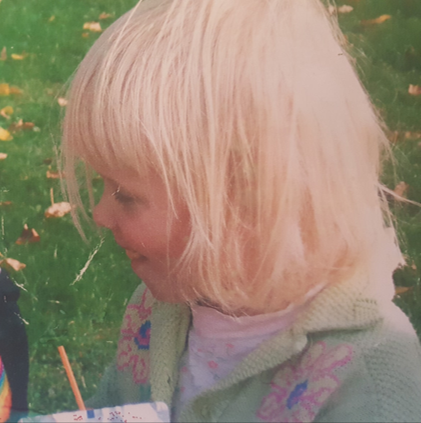
Name: Libby Rose
Location: London, United Kingdom
Child’s Birth Year: 2000
Keywords: Living with HIE
Libby currently lives in London and is studying to become a pediatric nurse. She is the youngest of four children. For the first two decades of her life, Libby had no idea she’d experienced an HIE event when she was born. Throughout her life, she always felt like something was slightly different about her, like she had to work hard to perform tasks that came naturally to her peers. But it wasn’t until this past year that she received some clarity.
Nearing the end of her NICU rotation for nursing school, Libby’s mentor told her that they would be reviewing a list of conditions they had not yet seen on the ward, but that still affect newborns in the NICU. Her mentor went over a few different types of congenital heart defects and a birth defect called gastroschisis, before landing upon the final condition to explain: hypoxic ischemic encephalopathy. When her mentor was describing some of the causes and problems that potentially can arise from HIE, Libby felt like she weirdly resonated with what she was hearing. During her break, Libby googled HIE and ended up discovering a tick list of her own life. It seemed like the puzzle pieces were starting to come together, like all the “otherness” she’d felt growing up wasn’t just in her head. With her suspicions that she may have suffered an HIE event, she called her mother, interrogating her about what had happened during the birth. Her mother confirmed her intuition.
Libby was born full-term, right around the forty-week mark. During labor, the midwife noticed that the cord was wrapped tightly around her neck and called for help. When Libby finally came out, she was in critical condition and needed to be resuscitated. Libby was kept in the NICU for a few days for observation, but she never underwent cooling because, at that time in England, it wasn’t available as a treatment option.
As a child, Libby experienced recurrent seizures, but they stopped by the time she started school. She also had a speech delay, but her older sister jokes that was because Libby was stubborn when it came to speech therapy. Instead, Libby relied on the few words she learned how to sign from a children’s TV show called Something Special to communicate with her family. Eventually, she caught up with her speech. Libby had also been queried about many neurodevelopmental conditions, such as ADHD and autism, although she has never been formally diagnosed. She has insomnia, and, in general, she has lived feeling like she’s been a step behind, causing a lot of stress and anxiety. It’s almost as if everyone else was given a guide for how to live life, and she just never received it.
When Libby first confronted her mother and learned that she had HIE, a wave of emotions flooded over her. She felt a sense of relief, as if everything suddenly made sense. But she also simultaneously felt anger, both that it happened to her in the first place and then that her parents didn’t mention it to her until now. She remembers wondering what would have happened if her parents had embraced her diagnosis and shared it with her, instead of keeping it a secret.Could she have gotten more formalized support in school instead of constantly feeling like she was playing a game of catch-up? Could she have avoided all those years confused and in the dark, not knowing what was wrong? Libby tried to place herself in her parents’ shoes. Her mother was a vicar, and they grew up in several different small villages in Somerset, which is in the West of England. In rural England, a pastor’s family is very much in the public eye, so there was always pressure on Libby and her family to maintain a good reputation. Constantly put on a pedestal, Libby’s mother probably didn’t want others to perceive her as a failure for not having that picture-perfect birth. So, when some well-meaning villagers put up a banner that literally read, “She has had a healthy baby girl,” Libby’s parents felt unable to correct them.
While Libby understands that her parents may not have been ready to share the truth with everyone in the village, she wishes they’d felt comfortable sharing the truth with her, especially since HIE, or disability, isn’t something to be ashamed of. Her parents were certainly not unsupportive, but they also didn’t acknowledge the HIE event and complications born from it. They treated Libby like all of her other neurotypical siblings, which wasn’t the right approach, since Libby had unique needs. Libby urge other HIE parents, even if their child has a mild to moderate presentation, to still tell them about the HIE. Regardless of whether you offer an explanation or not, children will often know that something happened to them. By offering them that sense of clarity, it can help them feel less alone and validate any struggles they may be experiencing. Had Libby never figured out she had HIE at birth, she would have never been able to find a potential avenue for support through Hope for HIE.
Even though it has been trying, having these neurodevelopmental challenges, and enduring the HIE event, has given Libby a different perspective on life. All three of Libby’s older siblings are extremely successful and competitive people. Growing up, Libby felt like she couldn’t measure up to their abilities. However, the younger of her older brothers, who has always been such a genius, gave up almost immediately the first time he found something difficult. Yet, because of everything Libby has dealt with, she is much more resilient and doesn’t let failure stop her from pursuing her passions. Because she had to put in all that extra work as a kid, just to keep up with her classmates, she developed a strong work ethic. Even when she had to retake her second year of university for not passing the first time, she was able to rebound quickly, viewing it as an opportunity to learn from her mistakes.
Many things don’t come easily to Libby, but finding joy has always been easy for her—whether it is joy in the seemingly small, everyday things, or joy in the process as opposed to the outcome. She doesn’t let her extra challenges stop her from experiencing life and from doing the things she loves, such as hanging out with her friends, listening to music, playing cards, and studying to help other children who have medical complications like she did.
Libby hopes that, by sharing her story, she can highlight that there are many cases of HIE that, unfortunately, result in loss and severe outcomes, and those stories, of course, need to be told. But that is only one side of the picture. There are also individuals who have fairly mild outcomes and go on to live relatively independent lives. Those stories are worthy of being shared as well.

Connect with families, read inspiring stories, and get helpful resources delivered right to your inbox.